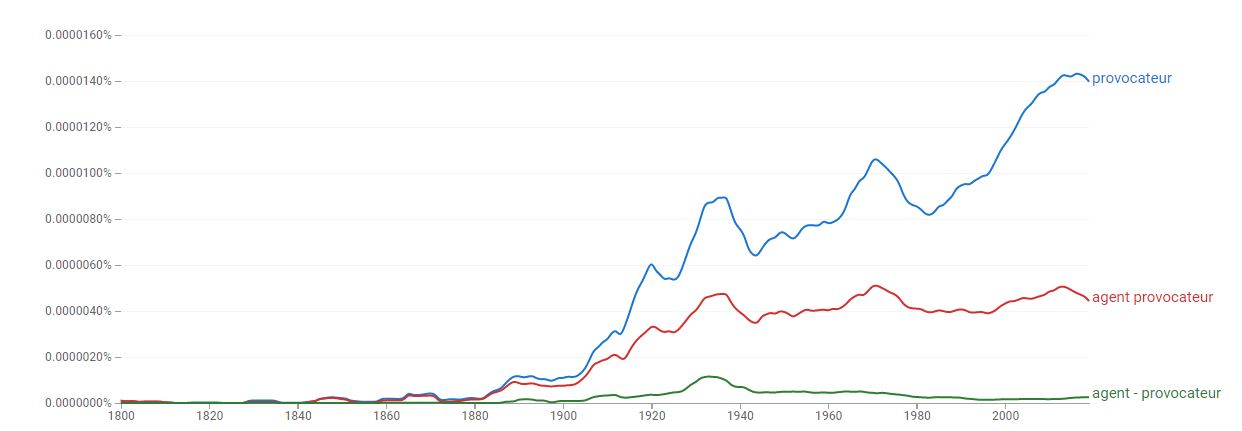Provocateur is present in Merriam-Webster's online dictionary ( https://www.merriamMerriam-webster.com/dictionary/provocateurWebster's online dictionary ) with two definitions:
1 : agent provocateur
2 : one who provokes
a political provocateur
The OED definition, meanwhile, is "A person who provokes a disturbance; an agitator; an agent provocateur". "Agent
"Agent provocateur", in turn, is defined first as a person employed by government to incite unrest in order to discredit a cause, but a secondary definition (dating back to the 19th century) records an "extended and figurative use": "A person or thing that incites some action or reaction; a provoking cause or agent."
Frequency
Frequency:
NGramsGoogle Ngram Viewer shows that the term "provocateur" has not only been increasingly in frequency in recent decades but, since 1980, has increased in frequency significantly faster than the term "agent provocateur" (of which it is sometimes seen as an abbreviated form) ( https://books.google.com/ngrams/graph?year_end=2019&year_start=1800&content=provocateur%2Cagent+provocateur%2Cagent-provocateur&smoothing=3&corpus=26&direct_url=t1%3B%2Cprovocateur%3B%2Cc0%3B.t1%3B%2Cagent%20provocateur%3B%2Cc0%3B.t1%3B%2Cagent%20-%20provocateur%3B%2Cc0 ).
The OED places the word "provocateur" in Frequency Band 4. This band is defined as follows: "Band 4 contains words which occur between 0.1 and 1.0 times per million words in typical modern English usage. Such words are marked by much greater specificity and a wider range of register, regionality, and subject domain than those found in bands 8-5. However, most words remain recognizable to English-speakers, and are likely be used unproblematically in fiction or journalism. Examples include overhang, life support, register, rewrite, nutshell, candlestick, rodeo, embouchure, insectivore...".
Meaning
Meaning:
A provocateur is someone who provokes. Not all use of "provocateur" is political (except perhaps in a very broad definition): the GuardianThe Guardian recently quoted Richard Saltoun describing the performance artist Ulay as follows: "Ulay was the freest of spirits – a pioneer and provocateur with a radically and historically unique oeuvre". ( https://www.theguardian.com/artanddesign/2020/mar/02/a-pioneer-and-provocateur-performance-artist-ulay-dies-aged-76 )
Ulay was the freest of spirits – a pioneer and provocateur with a radically and historically unique oeuvre.
Similarly, Diane Kashin wrote a blog about teachers as provocateurs ( https://tecribresearch.wordpress.com/2019/11/02/thought-provocations-the-teacher-as-provocateur/a blog about teachers as provocateurs ) and Forbes recently askedForbes recently asked "Are you an office peacemaker or a provocateur?" ( https://www.forbes.com/sites/joefolkman/2019/10/27/are-you-an-office-peacemaker-or-a-provocateur/ )
Idiomaticity
Idiomaticity:
There is nothing particularly weird or unnatural about the word. It retains its French spelling and approximate pronunciation, but, as its OED frequency band suggests, it is likely to be recognisable to most people and there is nothing unidiomatic about it (although I prefer to reserve the term "idiomatic" for phrases, constructions, etc, rather than using it to describe individual words).

